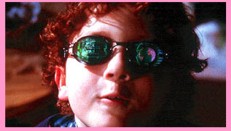 check the vision
check the visionkids don't have to be able to talk to have eye examinations. Most pediatric eye doctors (ophthalmologists and optometrists) use devices such as hand puppets to evaluate vision in young children. An ophthalmologist is a medical doctor who specializes in examining, diagnosing, and treating eyes and eye diseases, whereas an optometrist has been trained to diagnose and treat many of the same eye conditions as ophthalmologists, except for treatments involving surgery.
So when does your child need to have the first eye examination? The American Academy of Ophthalmology recommends the following:
- + Newborns should be checked for general eye health by a pediatrician or family physician in the hospital nursery.
- + High-risk newborns (including premature infants) , those with a family history of eye problems, and those with obvious eye irregularities should be examined by an eye doctor
- + In the first year of life, all infants should be routinely screened for eye health during well-baby visits with their doctors
- + Around the age of 3 1/2, children should undergo eye health screenings and visual acuity tests (or tests that measure sharpness of vision) with their doctors.
- + Around the age of 5, children should have their vision and eye alignment evaluated by their doctors. Children who fail either test should be examined by an eye doctor.
- + After age 5, further screening exams should be conducted at routine checks at school or at your child's doctor's office or after the appearance of symptoms such as squinting or frequent headaches. (Many times, a teacher will realize the child isn't seeing well in class.)
However, children who wear prescription glasses or contacts probably need annual checkups to screen for vision changes.
Signs that a young child may have vision problems include:
+ constant eye rubbing
+ extreme light sensitivity
+ poor focusing
+ poor visual tracking (following an object)
+ abnormal alignment or movement of the eyes (after 6 months of age)
+ chronic redness of the eyes
+ chronic tearing of the eyes
+ a white pupil instead of black
In school-age children, watch for other signs such as: inability to see objects at a distance, inability to read the blackboard , squinting, difficulty reading, sitting too close to the TV.
It's also a good idea to watch your child for evidence of poor vision or crossed eyes. If you detect any evidence of eye conditions, your child should be examined immediately so that the problem doesn't become permanent. If caught early, eye conditions can often be reversed. kids eyes healthy and care, baby kid child healty problem.